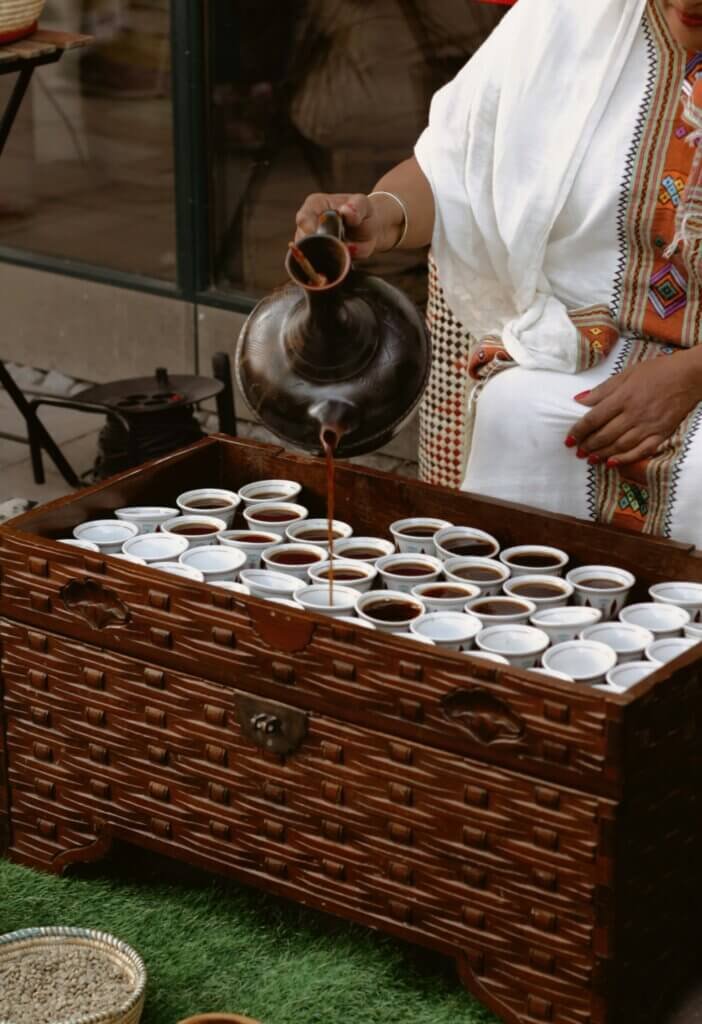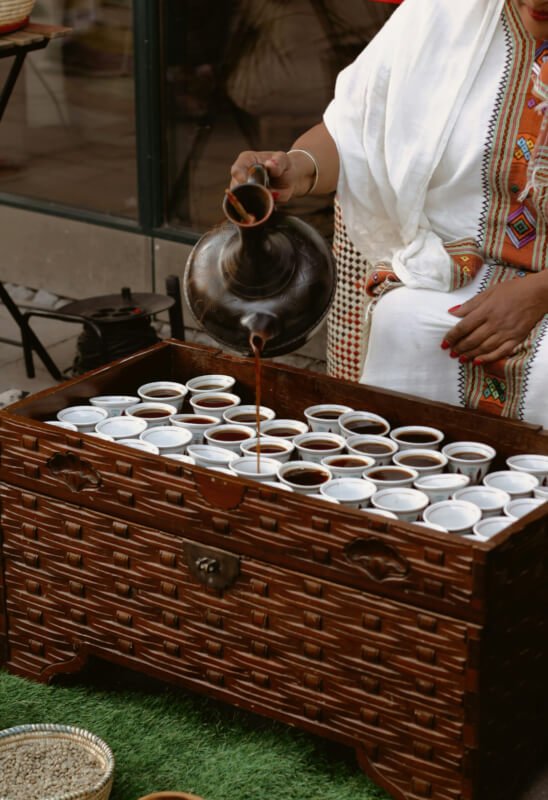Coffee is more than just a beverage; it holds a significant place in various cultures and traditions around the world. From the bustling coffee shops of Italy to the ceremonial coffee rituals in Ethiopia, this aromatic drink has woven itself into the fabric of societies. Exploring the different roles that coffee plays in diverse cultures allows us to understand the deep-rooted connections and rituals associated with this beloved elixir. So grab a cup of your favorite brew and join us on a journey to unravel the fascinating world of coffee in various cultures and traditions.

Ethiopian Coffee Ceremony
History of the Coffee Ceremony
The Ethiopian coffee ceremony traces its roots back to the ancient coffee forests of the Kaffa region, where coffee was discovered in the 9th century. Legend has it that a young goat herder named Kaldi noticed his goats becoming unusually energetic after consuming the red berries of a certain tree. Intrigued, he shared his findings with the local monks who then began using the berries to make a drink. Over time, this tradition evolved into the elaborate coffee ceremony that is now an integral part of Ethiopian culture.
Importance of Coffee in Ethiopian Culture
Coffee holds immense importance in Ethiopian culture, so much that it is often referred to as the “gift of God.” It is deeply ingrained in daily life and serves as a symbol of hospitality, friendship, and community. The coffee ceremony is a significant social ritual, representing the coming together of family, friends, and neighbors. It is also an occasion for sharing stories, discussing important matters, and fostering a sense of unity and belonging.
Coffee Ceremony Process
The Ethiopian coffee ceremony is a time-consuming and intricate process, showcasing the country’s rich cultural heritage. It typically takes place in a traditional Ethiopian household or village and is led by a designated woman, known as the “jebena bet” or coffee woman. The coffee beans are roasted, ground, and brewed in a traditional clay pot called a “jebena”. Throughout the ceremony, the aroma of freshly brewed coffee fills the air, creating an ambiance of anticipation and relaxation. The hostess pours the coffee from a height into small handleless cups, a process called “buna”, to enhance the flavors and create a frothy top known as “kaimaki”. Ethiopian coffee is often served alongside traditional snacks such as popcorn or roasted barley. The ceremony is a symbol of respect, friendship, and the appreciation of the simple pleasures of life.
Italian Espresso Culture
Introduction to Italian Espresso
Italy is renowned for its proud coffee culture, with espresso being the undisputed king of Italian coffee drinks. Italian espresso is known for its rich, concentrated flavor and its quick preparation method. The secret lies in the finely ground coffee beans, the perfect amount of pressure used during extraction, and the careful attention to creating a balanced and bold taste.
Role of Coffee in Italian Society
Coffee in Italy is more than just a beverage; it is a way of life. Italians have a deep-rooted love affair with coffee, and it forms an integral part of their daily routine. It is common to see Italians stopping at their favorite local coffee bar, known as a “caffè”, to grab a quick espresso on their way to work or during their lunch break. This ritual serves as a brief pause in the bustling Italian lifestyle, allowing individuals to recharge and savor the moment. Coffee also acts as a catalyst for social interactions, with many Italians using coffee bars as meeting places to catch up with friends, discuss current events, or simply people-watch.
Coffee Consumption Habits in Italy
Italian coffee consumption habits are unique in their emphasis on quality over quantity. Italians typically enjoy small servings of strong espresso rather than larger volumes of weaker coffee. The concept of “caffè sospeso”, or suspended coffee, is also prevalent in Italy. This is a tradition where individuals pay for an extra cup of coffee, leaving it unpaid for the next person who may not have the means to purchase their own. This act of kindness reflects the sharing and caring nature deeply embedded in Italian society, emphasizing the social and communal aspect of coffee.
Turkish Coffee Tradition
History of Turkish Coffee
The history of Turkish coffee dates back to the 16th century, during the Ottoman Empire. Coffee was introduced to Istanbul and quickly became an essential part of Turkish society. The method of preparation and consumption of Turkish coffee has remained remarkably unchanged throughout the centuries, preserving its rich cultural heritage.
Traditional Preparation Methods
Preparing Turkish coffee is a meticulous process that requires great care and attention. The coffee beans are ground to a very fine powder and boiled in a small copper pot called a “cezve”. Sugar and water are added to the pot, and the mixture is heated slowly over a low flame. The coffee is traditionally brewed without any milk or additional flavors. As it reaches boiling point and starts to foam, the pot is removed from the heat multiple times to control the foam and prevent it from overflowing. Once ready, the coffee is poured into small cups, and the sediment settles at the bottom. The thick, concentrated coffee is sipped slowly, allowing time to enjoy its robust flavor.
Importance of Coffee in Turkish Culture
Turkish coffee holds deep cultural significance in Turkey. It is not merely a drink but a symbol of hospitality, friendship, and tradition. Coffeehouses, known as “kahvehane”, have served as meeting places for individuals to engage in intellectual and social conversations for centuries. The coffee ceremony is often accompanied by fortune-telling using the coffee grounds left in the cup. This ritual adds an element of mystique and intrigue to the experience, making Turkish coffee a truly unique and cherished tradition.
Japanese Tea and Coffee Culture
Tea and Coffee in Japanese Society
In Japan, both tea and coffee play important roles in the cultural fabric of society. Traditional Japanese tea ceremonies, also known as “chado” or the “way of tea”, have been practiced for centuries. However, in recent decades, coffee has gained significant popularity, especially among the younger generation.
Tea Ceremony versus Coffee Culture
The tea ceremony in Japan is a highly choreographed and meditative practice that embodies harmony, respect, and tranquility. It emphasizes mindfulness and the appreciation of the present moment. On the other hand, the coffee culture in Japan is influenced by Western traditions, particularly from the United States. Coffee is often consumed casually, on the go, or in coffee shops, with an emphasis on convenience and variety.
Influence of Western Coffee in Japan
The introduction of Western coffee to Japan has brought about a cultural shift in the way coffee is consumed. Western-style coffee shops, such as Starbucks, have gained popularity and have become gathering places for young individuals to relax, socialize, and even study. The influence of Western coffee culture can also be seen in the rise of specialty coffee shops, where baristas meticulously brew and serve high-quality, artisanal coffees. This blending of traditional tea ceremonies and modern coffee culture showcases Japan’s ability to embrace and adapt to new influences while still cherishing its cultural heritage.

Arabian Coffee Tradition
Legend of Arabian Coffee
Arabian coffee, also known as qahwa, has a legendary origin story that dates back to the 15th century. According to folklore, it was discovered by a Yemeni shepherd named Khalid, who noticed his goats becoming more energetic after eating the berries from a certain tree. Curiosity led him to try the berries himself and experience their stimulating effects. Word quickly spread about this new discovery, and the cultivation and consumption of coffee spread like wildfire throughout the Arab world and beyond.
Gahwa: Traditional Arabian Coffee
In the Arab world, coffee is commonly referred to as “gahwa” and plays a central role in Arab hospitality. Arab coffee differs from other types of coffee in its preparation and presentation. The beans are lightly roasted and then ground to a fine powder. The coffee is brewed in a pot called a “dallah” and is often flavored with spices such as cardamom or saffron. It is traditionally served in small handleless cups called “finjan”, and the host continually refills the cups to signify generosity and hospitality.
Cultural Significance of Coffee in Arab World
Coffee holds immense cultural significance in the Arab world. It is a symbol of warmth, hospitality, and friendship. Arab hospitality dictates that guests must always be offered coffee as a gesture of welcome and respect. The coffee ceremony provides an opportunity for individuals to come together, share stories, and engage in meaningful conversations. It is also an essential part of many celebrations, weddings, and religious gatherings, further highlighting the deep cultural roots and importance of coffee in Arab society.
American Coffee Culture
Evolution of American Coffee Culture
American coffee culture has undergone a significant transformation over the years. In the early days, coffee was considered a utilitarian beverage, a means to stay alert and productive. However, with the arrival of immigrants from various coffee-rich countries, such as Italy and Ethiopia, the coffee culture began to evolve.
Starbucks and the Coffee Revolution
The introduction of Starbucks in the 1970s marked a turning point in American coffee culture. The coffeehouse concept offered a cozy and welcoming environment where individuals could gather, relax, and enjoy handcrafted coffee beverages. Starbucks became synonymous with the “third place” – a space between work and home where people could socialize, study, or have business meetings. This revolutionized the way Americans perceived and consumed coffee, as it shifted from a mundane drink to an experience.
Coffee and Socialization in American Society
Coffee has become an integral part of American society, serving as a social lubricant and a symbol of connectedness. From catching up with friends over a cup of coffee to business meetings conducted at coffee shops, the act of sharing a coffee has become a platform for building relationships and fostering community. American coffee culture is also characterized by its diversity and openness to experimentation. Specialty coffee shops have emerged across the country, offering a wide range of coffee beans, brewing methods, and flavor profiles, catering to the diverse tastes of the American population.

Scandinavian Coffee Culture
Nordic Coffee Tradition
Scandinavian countries, such as Sweden, Norway, and Denmark, have their unique coffee culture rooted in the concept of “hygge”. Hygge represents coziness, comfort, and creating a warm and inviting atmosphere. In Scandinavia, coffee is enjoyed throughout the day, and the act of drinking coffee is often accompanied by a sense of relaxation and connection with loved ones.
Fika: Coffee Break Ritual
Central to Scandinavian coffee culture is the tradition of fika. Fika is a daily ritual that involves taking a break to enjoy a cup of coffee, usually accompanied by a sweet treat like a cinnamon roll or a pastry. Fika is more than just a coffee break; it is a cultural practice that brings people together and fosters a sense of community. It is an opportunity to pause and appreciate the simple pleasures of life, promoting work-life balance and overall well-being.
Modern Coffee Trends in Scandinavia
Scandinavia is known for its emphasis on sustainability, quality, and innovation in the coffee industry. The region has witnessed a surge in specialty coffee shops that prioritize direct trade relationships with coffee farmers and focus on showcasing unique coffee flavors. Additionally, coffee competitions, such as the World Barista Championship, have put Scandinavian baristas on the global stage, further elevating the region’s coffee culture. The Scandinavian coffee culture continues to evolve, blending tradition with modernity, and setting new standards for the coffee industry worldwide.
Brazilian Coffee Culture
Brazil’s Importance in Global Coffee Trade
Brazil is the largest coffee producer in the world and has played a significant role in shaping the global coffee trade. Coffee cultivation in Brazil began in the 18th century, and the favorable climate and vast land resources allowed for massive coffee plantations to flourish. Brazilian coffee beans are known for their mild flavor profile and are used as a base for many coffee blends around the world.
Cafézinho: Brazilian Coffee Culture
In Brazil, coffee is deeply ingrained in daily life and is enjoyed throughout the day. The culture of “cafézinho,” meaning “little coffee,” is prevalent, and it refers to the small and strong cups of coffee served to guests or customers. Offering cafézinho is a gesture of hospitality, and it is customary to never refuse a cup when visiting someone’s home or a local establishment. The act of sharing coffee fosters connections and strengthens social bonds in Brazilian society.
Coffee in Brazilian Daily Life
Coffee is not only consumed as a beverage but is also an integral part of Brazilian cuisine. The traditional breakfast, known as “cafe da manha,” often includes black coffee alongside bread, cheese, and fruit. Many Brazilians also enjoy a mid-afternoon coffee break called “cafezinho da tarde” to provide an energy boost. Brazilian coffee culture celebrates the richness of the country’s coffee heritage and reflects the vibrant and lively spirit of its people.

Vietnamese Coffee Culture
Distinctive Vietnamese Coffee Style
Vietnamese coffee is known for its unique and distinct preparation style. Vietnamese coffee typically consists of robusta coffee beans, which are known for their strong flavor and high caffeine content. The coffee is often served with sweetened condensed milk, resulting in a rich and creamy beverage that contrasts the boldness of the coffee.
Traditional Coffee Brewing Techniques
Vietnamese coffee is traditionally brewed using a small stainless steel filter called a “phin”. The filter is placed on top of a cup or glass, and finely ground coffee is added to it. Hot water is poured over the coffee, and the brewing process is slow as the water gradually drips through the filter, extracting the flavors and aroma of the coffee. Once the brewing is complete, the coffee is mixed with sweetened condensed milk to create the signature Vietnamese coffee experience.
Cultural Significance of Coffee in Vietnam
Coffee has become deeply ingrained in the daily life and culture of Vietnam. The act of drinking coffee, especially in social settings, is a cherished tradition. Vietnamese coffee shops, often bustling with activity, serve as popular gathering places for friends, families, and colleagues to come together. Coffee is enjoyed at a leisurely pace, encouraging conversations, and providing a pause from the fast-paced nature of Vietnamese society. Vietnam’s strong coffee culture reflects the resilience, adaptability, and creativity of its people.
Indian Coffee Tradition
Southern Indian Filter Coffee
In India, coffee has a strong presence in the southern states, particularly in Karnataka, Kerala, and Tamil Nadu. South Indian filter coffee, commonly referred to as “kaapi,” is a unique and cherished tradition. It is made using a metal coffee filter, which allows the water to slowly drip through the ground coffee, resulting in a strong and flavorful brew.
Coffee in Indian Festivals and Rituals
Coffee holds cultural significance in various Indian festivals and rituals. During auspicious occasions, like weddings or religious ceremonies, coffee is served to guests as a symbol of hospitality and respect. It is also a common practice to offer coffee to deities during religious rituals as a way to honor and seek blessings.
Café Culture in Major Indian Cities
In recent years, Indian cities have witnessed the rise of café culture, with coffee shops becoming popular hangout spots for the younger generation. These contemporary coffee shops offer a wide range of coffee varieties, international flavors, and trendy aesthetics. Café culture has transformed the way coffee is perceived and consumed in India, with an emphasis on modernity, creativity, and inclusivity.
As we explore the role of coffee in different cultures and traditions, we realize the universality and diversity of this beloved beverage. From intricate coffee ceremonies to casual coffee breaks, coffee serves as a social and cultural adhesive, connecting people across continents. Each unique coffee culture offers a glimpse into the history, values, and traditions of its respective society. So, whether you find yourself sipping a strong Turkish coffee, enjoying a fika in Scandinavia, or indulging in a cup of Brazilian cafezinho, remember that every coffee experience tells a story, inviting you to immerse yourself in the rich tapestry of our diverse world.



